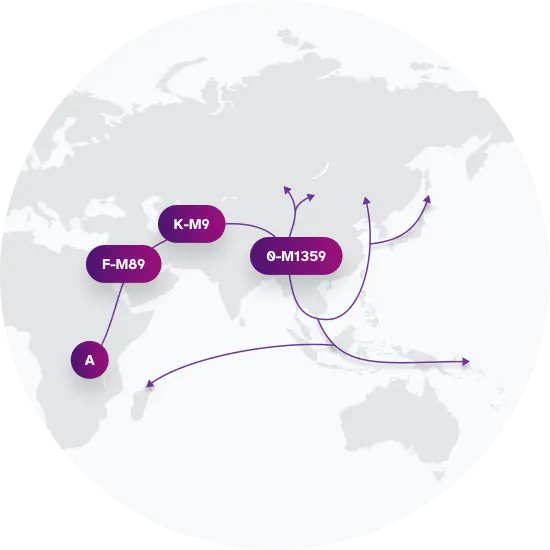Haplogroup O-FGC19713
What is Paternal Haplogroup O-FGC19713?
Haplogroup O-FGC19713, also known as Haplogroup O-M1359 (Y Chromosome Consortium long-form label), is a genealogical group of lineages defined by unique genetic markers present on the Y-chromosome. Your paternal haplogroup, or that of your father if you do not have a Y-chromosome, paints a picture of your ancient origins and the migrations of your ancestors. Although your paternal haplogroup reflects just one of your many ancestral lineages, it carries information about that lineage over tens of thousands of years.
Haplogroup O-FGC19713 is descended from haplogroup O-M1359. Among 23andMe research participants, haplogroup O-FGC19713 is commonly found among populations in China and Taiwan.
It's important to note that your haplogroup doesn't define your current ethnic identity; rather, it provides an insight into your deep ancestry on the paternal side.
 Paternal Haplogroup Origins O-M1359
Paternal Haplogroup Origins O-M1359Top Surnames with Haplogroup O-FGC19713
For surnames with sufficient representation in the data, these percentages represent the frequency with which each surname is found in individuals exhibiting this genetic marker.
Haplogroup O-FGC19713 is linked to many Indian ethnic groups
Haplogroup O1b1a1a is thought to have arisen in India, roughly 25,000 to 40,000 years ago, and is present in many Indian ethnic groups today. The Indian subcontinent holds four major language groups, called Austro-Asiatic, Dravidian, Indo-European, and Tibeto-Burman. Haplogroup O-M95 likely originated in Indian Austro-Asiatic populations. Its early members carried both the O1-M95 haplogroup and Austro-Asiatic languages further into Southeast Asia through the Northeast Indian corridor. Current research suggests migrating members of O-M95 left eastern India traveling east, through Myanmar, southern China, Vietnam, Laos, Cambodia, and Thailand, and ended in the Andaman and Nicobar Islands. One study found that 100% of a Nicobar Island population belonged to haplogroup O-M95.

